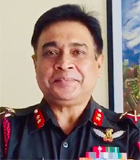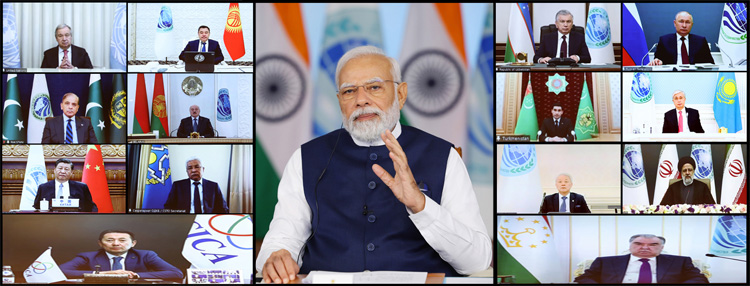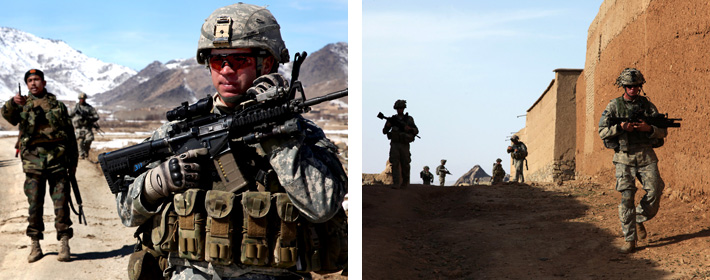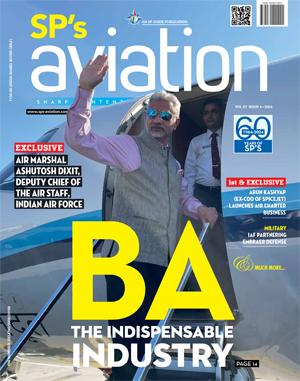INDIAN ARMED FORCES CHIEFS ON
OUR RELENTLESS AND FOCUSED PUBLISHING EFFORTS

SP Guide Publications puts forth a well compiled articulation of issues, pursuits and accomplishments of the Indian Army, over the years

I am confident that SP Guide Publications would continue to inform, inspire and influence.

My compliments to SP Guide Publications for informative and credible reportage on contemporary aerospace issues over the past six decades.
Global War on Terror Going Nowhere
Navigating the Global War on Terror through Complex Realities as it turns out to be the most expansive and expensive global conflict spanning multiple wars
 |
The Author is former Chief of Staff of a frontline Corps in the North East and a former helicopter pilot. He earlier headed the China & neighbourhood desk at the Defence Intelligence Agency. He retired in July 2020 and held the appointment of Addl DG Information Systems at Army HQ. |

George W. Bush first used the term "war on terrorism" on September 16, 2001, and then "war on terror" a few days later in a formal speech to Congress following the September 11 attacks. Thus, was born the Global War on Terror (GWOT) which is turning out to be the most expansive and expensive global conflict spanning multiple wars. It continues to dominate narratives in summits and conferences the world over, the latest being the Shanghai Cooperation Organisation (SCO) Summit on July 4, 2023 hosted by India. As the outcome of the Summit, the leaders adopted the New Delhi Declaration and one of the two thematic joint statements centred on cooperation in countering the radicalisation leading to separatism, extremism and terrorism.
Unravelling the Complex Web of State-Sponsored Terrorism and the roles played by Pakistan, China and Iran in using terrorism as statecraft
These declarations and statements are good optics and look promising to the uninitiated and the misinformed public as much as they somewhat burnish the image of the leaders that espouse such lofty goals. It is good theatre because some of the member countries continue to use terrorism as statecraft. The SCO has China as its Prima Donna and the country enjoys close relationship with and has huge influence over two other members, Pakistan and Iran, countries that use export of terror as their major enabling foreign policy instrument. Terrorism in India is characterized by communist, Islamists and separatist groups. Communist (Naxalite) insurgent groups are by far the most frequent perpetrators and the main cause of terrorism deaths in India and the major source of arms for the Naxalites is suspected to be Chinese, funnelled through the porous borders of Northeast and Nepal. Pakistan's role in fuelling terror in J&K and a string of attacks like on Indian parliament and the attack in Mumbai demonstrates its intent, its economic bankruptcy notwithstanding. So, if this troika as part of the SCO has endorsed the Delhi declaration, read what you like.
State-sponsored terrorism persists with China, Pakistan and Iran having significant roles in supporting and exporting terror as foreign policy instruments.
GWOT followed the 9/11 attack in which 15 of the 19 terrorists involved were citizens of Saudi Arbia. Yet, from Afghanistan to Iraq to Libya, Syria and Yemen, a host of other countries have been bombed and decimated as part of the GWOT. It raises questions on what exactly GWOT aimed at and whether it has inflamed terrorism rather than snuff it out. Wahhabism remains the source of most radical Islamic extremism. Out of the 61 groups that are designated as terrorist organisations by the US State Department, the overwhelming majority are Wahhabi-inspired and Saudi-funded groups, with a focus on the West and Iran as their primary enemy. Nearly all of the Sunni militant groups listed receive significant support from either the Saudi government or Saudi citizens.

But of course, the sponsors forget that sometimes things can go out of hand. The 1979 Iranian revolution was not the only seismic event to shake the Gulf and the Middle East that year. In November 1979, Juhayman al-Otaibi, a former corporal in the Saudi National Guard, seized the Ka'aba in Mecca with a Salafi armed group proclaiming the arrival of al-Mahdi, the redeemer of Islam whose appearance, according to the hadith (Prophet's sayings), heralds the Day of Judgment, and calling for the overthrow of the House of Saud. Using French mercenaries, al-Otaibi was dislodged from the Grand Mosque with extreme bloodshed. The French commander Paul Barrell later revealed that over 5000 were killed, 3000 of them pilgrims who were there at the time of the seizure.
Closer home, Pakistan has witnessed numerous dreadful attacks on mosques and schools, security establishments and border posts by ISIL (ISIS) affiliates such as the Islamic State in Khorasan Province and groups such as Tehrik-e-Taliban Pakistan (TTP) that are offshoots of Taliban it helped to create. In February this year, a deadly suicide bombing claimed by the TTP at a mosque located inside a high-security police compound in the northwestern city of Peshawar killed at least 100 people and wounded more than 200 in the deadliest attack in a decade.
Wahhabism remains a potent source of radical Islamic extremism, with the majority of US-designated terrorist organisations being Wahhabi-inspired and Saudi-funded, targeting the West and Iran.
As part of the GWOT, the US runs a global assassination campaign using sophisticated armed drones to assassinate people who the US government suspects of intending to harm it someday. Though the US justifies by saying it is a terror generated campaign and a response to the 9/11 attack, the drone attacks no doubt kills hundreds of innocents in what it dismisses as collateral damage. Those that survive these close encounters are aggrieved and offer easy catchments for recruitment by terrorist organisations. Deteriorating conditions in detention facilities (like Abu Ghraib and Guantanamo Bay) and displacement camps in northeast Syria, in particular, are serving as a rallying cry for terrorist activities. They have already fuelled instances of terrorist radicalisation, fund-raising, arms smuggling, training and incitement to terror.
Undoubtedly, the ISIS-core has experienced significant decline in capability and loss of territory, but it is not defeated. The Islamic State's strategy is based on a staged approach, not dissimilar from the Maoist strategy of protracted warfare. They expect to oscillate between stages before eventual victory. It is important to remember that it is this strategy that is arguably its primary export to global affiliates.
Terrorism continues as a pervasive and growing threat, evident in the migration crisis impacting Europe and the spread of Islamic extremism in European societies.
As the US pivots to the Indo-Pacific to counter China, the GWOT has taken a back stage. This even while terrorism remains a pervasive threat, the scale of the challenge and the violent ideologies that underpin it is still immense, perhaps growing. The hordes of migrants that swarmed Europe through Turkey especially after the US sponsored Arab Spring may have become the primary source of terror there. The French riots that have now spread to Switzerland and Belgium dispels the notion that an 'open society', and the freedom to think, act and express openly etc can work as a bulwark against religious extremism of any sort. The disquiet in Europe is compounded by the fact that Islamic extremism has permeated quite deeply into these societies.
In India, the citizens should be cognisant of the nature and scale of jihadist threat as they are the first line of defence. Developments in France and elsewhere have proven beyond doubt that only the state through its military and security establishments is not capable of defeating this growing menace. The war on terrorism has to be fought by the society as much as by the state so that we preserve our culture, heritage, and our way of life for our children and their next generations.





